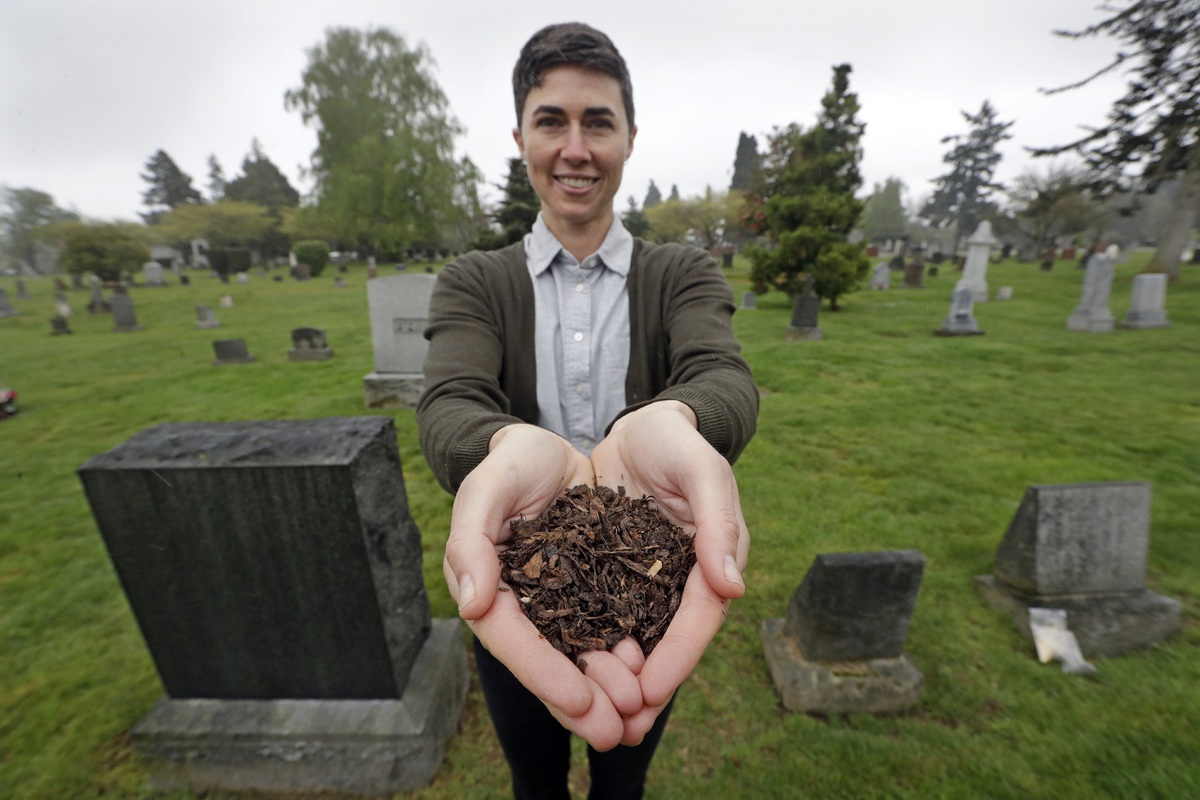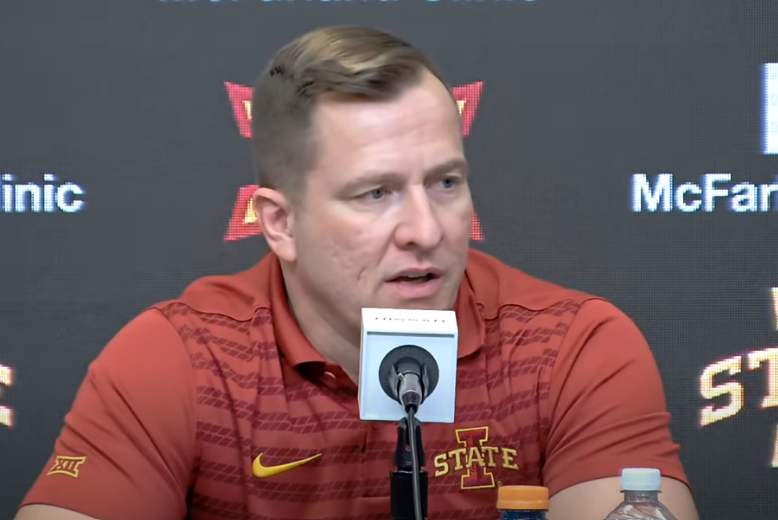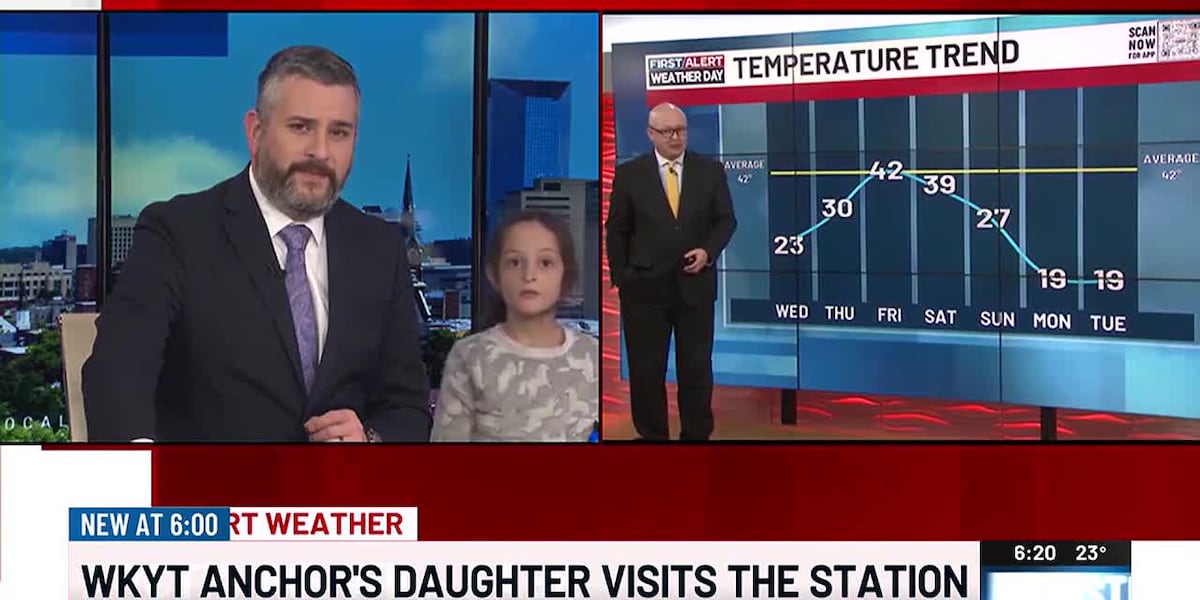Elaine Thompson AP File (2019)
Katrina Spade is founder and CEO of Recompose, a Washington state-based company that employs human composting as an alternative to burial or traditional cremation of human remains. Here, in a cemetery in Seattle, she displays a sample of compost material left from the decomposition of a cow using a combination of wood chips, alfalfa and straw — the same materials used in human composting. Last month, Assembly Bill 289 became law and made Nevada the sixth state to approve “natural organic reduction,” or human composting.
Sunday, July 2, 2023 | 2 a.m.
When Nevadans die, their survivors could soon have another option besides burial or cremation for their loved one’s final disposition.
The signing of Assembly Bill 289 into law during the recently concluded legislative session broadens the state’s rules on cremation to include the accelerated conversion of human remains to soil through the natural reduction of human remains, also known as natural organic reduction or human composting.
Unlike traditional burials — when human bodies are embalmed, placed in caskets and buried or entombed — or cremations that burn the bodies to ashes, natural organic reduction converts bodies into soil faster than standard decomposition, according to Seattle-based “green funeral home” Recompose.
It uses natural materials like alfalfa and wood chips to mimic the process that organic material decomposes on forest floors and becomes topsoil.
With Nevada, the practice is legal in six states.
“To me, it seems like a pretty neat thing to drive by and tell your children that grandma is part of that forest,” said Assemblyman Max Carter, D-Las Vegas, who was the bill’s primary sponsor. “Seems nicer than going and visiting a graveyard.”
Human composting can take anywhere from two to four months for the bodies to decompose, according to Recompose, and produces about one cubic yard — or around 1,000 pounds — of soil per body.
During the process, corpses must stay in a temperature-controlled unit, soil must be turned over periodically and bones must be broken down to a certain level set by state standards.
Washington was the first state to legalize the disposition method in 2019. California, Colorado, New York, Nevada, Oregon and Vermont have followed.
It’s one of two environmentally friendly ways approved for body disposal in Nevada. Aquamation, or alkaline hydrolysis, a process that uses heated water and alkaline to reduce a body, was approved in 2017 with the signing of Assembly Bill 205.
Much like aquamation, human composting is believed to be more sustainable than traditional burials or cremation.
Burials involve putting harmful embalming chemicals and other materials like granite into the ground.
A single cremation is estimated to emit about 190 kilograms of carbon dioxide into the air, according to a report in Chemical and Engineering News. That’s the equivalent of driving 470 miles in a car.
Meanwhile, human composting has “no chemicals that are applied … no heat that is applied” and provides people with a more natural way to be buried, said Stephanie McGee, executive director of Nevada’s Board of Funeral and Cemetery Services.
It also uses 87% less energy than cremation does, according to Recompose.
Cost, work and water
Bill Vallie Jr., funeral director at Davis Funeral Homes & Memorial Park in Las Vegas, said many people would not opt for a green funeral for several reasons, such as cost, access to space for the soil and lack of a traditional headstone or memorial.
The average cost of a funeral viewing and burial was $7,848 in 2021 while a viewing and cremation was around $6,970, according to the National Funeral Directors Association.
These costs include transfer of the human remains, preparation of the body, use of the funeral home facilities among other services, and the casket. A headstone, plot of land or other cemetery costs were not mentioned in those averages.
In the mountain region, where Nevada was listed, the average prices are slightly lower — $6,888 for a viewing and burial, or $5,694 for a viewing and cremation.
Recompose said its services cost about $7,000 and include “guidance from (its) services team from the time of death through the transformation into soil eight to 12 weeks later.”
“It’s going to be a pretty big endeavor,” Vallie said. “As far as an impact on the funeral business, especially here in Las Vegas, it’s going to be a little bit pricier.”
Vallie said he would charge between $8,000 to $10,000 based on the facilities needed and manpower alone for natural organic reduction, but there’s still much work to be done before the home can offer that service.
To complete the composting process, Vallie said he would have to install new, specialized containers to hold the bodies as they decompose and protect them from any rodents or temperature changes, which would affect the process.
There’s also the matter of smell, and the extra work that will have to go into turning the soil a few times throughout the two to four months, he added.
One of Vallie’s biggest concerns with human composting is one that has affected various industries in Southern Nevada: water availability.
In Washington, memorial gardens or forests are one place where people can use their loved one’s soil to plant a tree, according to Recompose. They can also use the soil in their personal gardens.
Vallie said that making these gardens not only requires “several hundred acres” to spread the soil of the composted bodies, but also some of Southern Nevada’s limited water supply.
He believes states where it rains often or rural regions with free space — such as Northern and central Nevada — would benefit more from this style of body disposition.
Also, Vallie stresses, there’s the memorial aspect to consider.
“I don’t see people in this part of the country, in this city specifically, being able to do that,” Vallie said. “Having a burial ground, having some place to go makes a difference; it does bring some closure.”
Cremation has been a popular option for body disposition in Nevada anyway, Vallie added.
About 59% of Americans opted for cremation in 2022, and Nevada had the highest percent of cremations in 2021 at 81.9%, according to the Cremation Association of North America.
Las Vegas especially tends to skew toward cremation, given its large population of transient or out-of-state residents who may not want to be buried here.
Wait until next year
You still can’t walk into a funeral home in Las Vegas and ask to be composted.
McGee said a set of regulations for natural organic reductions would first have to be formulated in the state. The Board of Funeral and Cemetery Services has until Dec. 31, a day before the law goes into effect, to add human composting to the list of acceptable body disposition methods, she said.
Because human composting is under the same disposition license as cremation, the board is required to create this set of regulations, parameters and guidelines before funeral homes or “green burial” companies can operate.
Some of the rules can be taken from existing, already-legal disposition processes, but McGee said they “may not parallel.”
For example, one of those discrepancies involves heat. In cremation, there are strict guidelines on the use of heat, but human composting doesn’t require elements like fire and won’t translate over.
The board is looking to consult with other states that have human composting in place, and it has already started planning where to start the rule-making process.
“I’ll have to learn what are the issues that (other states) found and how will those things translate to Nevada, and I would say especially the Las Vegas area being drier and having limited water, how will that impact it,” McGee said.
During the next few months, McGee and her team will consult with industry experts and research what regulations would be best applicable for the state, but there’s no clear timeline yet on when they will finish.
Regardless of the mixed opinions and industry red tape, Assemblyman Carter is confident more people in Nevada will open their minds to human composting.
He said he saw much support for the bill despite a lengthy hearing process, adding that he hadn’t been approached by anyone with worries over water, space or costs. Carter noted he did not reach out to funeral managers or morticians while drafting the bill.
The only opposition Carter faced came from people who he said couldn’t get over the “ick factor” — claiming they didn’t want to be “thrown on a compost pile.”
He said the price was comparable to cremation or traditional burials, with the extra benefit of a more environmentally friendly disposition process.
“Once they got over that initial ick factor, all of a sudden they’re like, ‘Oh,’ a lightbulb would go off — and that’s what I always wanted,” Carter said. “You hear people talk about it all the time, they want their ashes to be buried and a tree to grow (but) this is actually better for the tree than ashes.”




















/cdn.vox-cdn.com/uploads/chorus_asset/file/25822586/STK169_ZUCKERBERG_MAGA_STKS491_CVIRGINIA_A.jpg)

/cdn.vox-cdn.com/uploads/chorus_asset/file/25821992/videoframe_720397.png)




